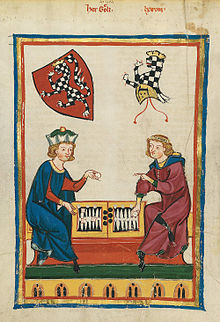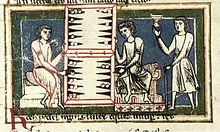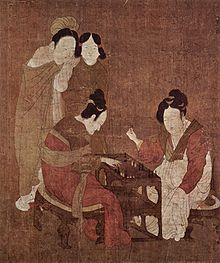Litterzabel

Wurfzabel (also Trictrac / Tricktrack or Puff ) is a medieval dice board game. The old word Zabel means "game board" and goes back to the Latin tabula "board", "board" - just like the word board .
The name puff originally mimicked the sound of falling dice. The vulgar expression for brothel goes back to the name of the game that was played in these houses earlier - so you went to play, "to the brothel".
history
The origins of the Litterzabel are believed to be in India, Persia and ancient Egypt. The Romans knew it under the name Ludus duodecim scriptorum ("twelve-line game") or tabula . Tables for this game are first mentioned in German-speaking countries around 1180. In the middle of the 15th century it was recorded that in addition to chess, throwing tables could also be found in most aristocratic houses. The modern backgammon developed from the Wurfzabel game, the board and rules of which are derived directly from the medieval version.
regulate
Various rules of the game from the 13th century can be found in the Libro de los juegos ("Book of Games") Alfons the Wise . In contrast to backgammon and its numerous variants, in the case of the pouf or throwing table, all pieces are first thrown onto the board . The lower number of the two dice is always drawn. If this is not possible (due to a blockade), it is the opponent's turn. After a double , the double rolled (for example 4 × 2) is drawn four times and then the double opposite (for example 4 × 5) is drawn four times. If the double cannot be drawn completely, it is the opponent's turn to roll the dice again. An additional litter follows.
There are also special rules if a player wins twelve points without his opponent even scoring in between ( bredouille ).
There are two main variants:
- In the counterpuff or counterpuff , one player starts on field 1 and his opponent on field 12a or 24.
- In the Langzabel or Long Puff , both players start on space 1 and drive from there to spaces 12 or 24.
In the Black Forest , the long puff has been preserved under the name Brettle to this day and is being promoted again around Furtwangen .
Other variants

- In the Russian Puff , as soon as he has two stones in the field, the player can choose whether he wants to move on with them or whether he wants to use more stones.
- In the Dutch Puff , no player is allowed to hit an opponent's stone before he has moved his own stone onto the last point of the opposing field of action.
- Kotra or Kvátrutafl is an Old Icelandic variant of the throwing tag.
- Tric Trac is a French variant that spread across Europe in the 16th century.
- Backgammon is the modern version of the throwing table
Idioms
The phrase “have a stone in someone's mind” as a synonym for “have a lot of sympathy with someone” goes back to the game of throwbacks. In the game it is important to place your stones well. Whoever succeeded in doing this had the prospect of profit and success.
The French expression Bredouille probably also goes back to the game (see there).
Web links
- La Partie de trictrac (1830) , story by Prosper Mérimée (French) - The trick track game
- A Game of Trictrac (translation of the Mérimée text into English)
- Copy and explanation of the Trictrac-relevant verses from Le Joueur (1696) , play by Regnard (French)
